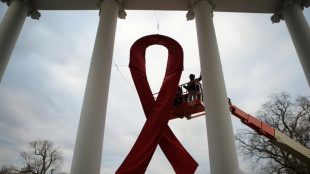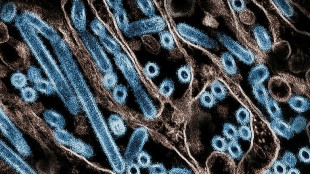

World urges restraint after Iran's unprecedented attack on Israel
World leaders urged restraint on Sunday after Iran launched an unprecedented wave of missiles and attack drones against its arch foe Israel overnight, at a time the Gaza war has inflamed Middle East tensions.
Iran launched the attack, its first ever to directly target Israeli territory, in retaliation for a deadly air strike widely blamed on Israel that destroyed its consular building in Syria's capital early this month.
Israel and its allies intercepted the vast majority of the incoming projectiles, the Israeli army said, reporting 12 people injured and no deaths, but the attack sharply heightened fears of an Israeli counterstrike.
G7 leaders condemned Iran's unprecedented attack and called for "restraint" on all sides, European Council President Charles Michel wrote on X following a video conference and ahead of a planned 2000 GMT meeting of the UN Security Council.
"We will continue all our efforts to work towards de-escalation. Ending the crisis in Gaza as soon as possible, notably through an immediate ceasefire, will make a difference."
Israel's top ally the United States also urged caution and calm.
"We don't want to see this escalate," White House National Security Council spokesman John Kirby told NBC. "We're not looking for a wider war with Iran."
President Joe Biden reaffirmed "ironclad" US support for Israel, but also appeared to guide its ally away from a military response against their common adversary Iran.
News outlet Axios reported that Biden had told Israeli Prime Minister Benjamin Netanyahu that he should "take the win" and that Washington would oppose an Israeli counterattack.
Before Tehran attacked, Israel's military had warned Iran it would suffer the "consequences for choosing to escalate the situation any further".
Netanyahu was on Sunday meeting his war cabinet, put in place amid the Gaza conflict sparked by the October 7 attack by Palestinian militant group Hamas.
Through the night, air raid sirens wailed and Israeli citizens sought cover in bunkers and shelters, as missile defence systems and fighter-jets intercepted drones and missiles in the night skies.
Iranian President Ebrahim Raisi on Sunday warned Israel against a "reckless" retaliation, warning that this would spark "a decisive and much stronger response".
- Missiles, attack drones -
Iran's mission to the United Nations also warned Washington to keep out of its conflict with Israel.
It added in a message on X that "the matter can be deemed concluded".
"However, should the Israeli regime make another mistake, Iran's response will be considerably more severe."
Israeli Defence Minister Yoav Gallant said on Sunday that "the campaign is not over yet -– we must remain alert".
Iran said its drone and missile attack came in response to the April 1 air strike on Tehran's consulate building in Damascus, which killed seven Revolutionary Guards including two generals.
The Islamic republic launched more than 300 drones and missiles towards Israel from late Saturday, Israel's military said.
While 170 drones and 30 cruise missiles were shot down before reaching Israel, a few of the 110 ballistic missiles did get through, it said.
One of those wounded in Israel was a seven-year-old girl near the southern town of Arad who was in intensive care.
Iran's allies including Lebanon's Hezbollah joined the attack. Yemen's Iran-backed Huthi rebels also launched drones at Israel, security agency Ambrey said.
British and other allied jets and Jordanian defences also shot down incoming missiles, mostly before they reached Israeli airspace.
Israeli military spokesman Rear Admiral Daniel Hagari said that 99 percent of the launches were intercepted and declared that "the Iranian attack was foiled".
Israel, Iraq, Jordan and Lebanon all said Sunday they had reopened their airspace after suspending air traffic during the attack.
- 'Satisfying Iran's honour' -
Iran had earlier seized an Israeli-linked container vessel in the Gulf, putting the whole region on alert.
The Iranian army declared that its attack was "completed successfully", and that it was in "self defence", and Syria also said Iran had exercised its "right to self-defence".
Iran's "Operation Honest Promise... achieved all its objectives", armed forces chief of staff Mohammad Bagheri said.
Hundreds of Iranians waved Iranian and Palestinian flags on Sunday in Tehran's Palestine Square.
Analyst Nick Heras of the New Lines Institute for Strategy and Policy told AFP that Saturday's attack was "all about satisfying the honour of Iran".
"This recent escalation in the Middle East is about the treacherous state of US and Iran relations, in which Israel is just one arena of conflict," he said.
- 'Spiral of violence' -
NATO said it was "vital that the conflict in the Middle East does not spiral out of control".
Similar calls came from Britain, Canada, China, Egypt, France, Indonesia, Iraq, Russia, Saudi Arabia, Turkey and the Vatican, where Pope Francis called for "an end to any action which could fuel a spiral of violence".
The attack came as the Israel-Hamas war raged in besieged Gaza.
Thousands of Gazans flooded the coastal road north after hearing that several people managed to cross a closed checkpoint towards Gaza City, despite Israel denying it was open.
The war began with an unprecedented October 7 attack by Hamas against Israel, resulting in the deaths of 1,170 people, mostly civilians, according to an AFP tally based on Israeli figures.
Israel's retaliatory offensive has killed at least 33,729 people in Gaza, mostly women and children, according to the territory's Hamas-run health ministry.
Late Saturday, Hamas said it had submitted its response to a truce plan presented by US, Qatari and Egyptian mediators at talks that started in Cairo on April 7.
Hamas said it was sticking to its previous demands, insisting on "a permanent ceasefire" and the "withdrawal of the (Israeli) occupation army from the entire Gaza Strip".
Israel's Mossad spy agency called this a rejection of the proposal, accusing Hamas of "continuing to exploit the tension with Iran" and aiming for "a general escalation in the region".
burs-jd/fz/jsa
H.Alejo--ESF



